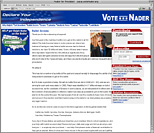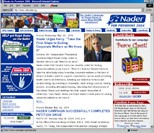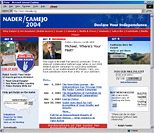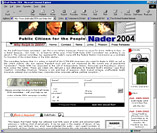Citizen Works Democracy Rising
Travels Organization Finances Images P2000 page
Efforts to Stop Nader
Speculation about whether Nader would make another run began soon after the 2000 campaign. He was seen as the leading Green Party presidential prospect, although there was division among Greens on another Nader campaign; after all Nader had never joined the Green Party. Progressives had divergent views as well. Ronnie Dugger penned an article "Ralph, Don't Run" in the December 2, 2002 issue of The Nation. Nader still had his supporters, however, evidenced by the formation in February 2003 of the Draft Nader 2004 Committee, an unconnected PAC chaired by entrepreneur Brian Crawford.
Continuing Citizen Activism
In 2001 Nader formed a couple of new nonprofit organizations to oversee
his activities: Citizen Works, which aimed to "give people the tools
and
opportunities to build democracy," and Democracy Rising, a 501(c)(4)
organization
through which he did a series of "People
Have the Power" rallies. He also wrote a book, CRASHING
THE PARTY: Taking on the Corporate Government in an Age of Surrender
(St. Martin's Press, Jan. 17, 2002), which he launched with a two-week,
nine city tour. On the overseas front, Nader visited Cuba on July
7-9, 2002 and met with President Fidel Castro.
Meanwhile, an issue emerged which highlighted perfectly Nader's decades-long calls for corporate accountability: Enron. At a Citizen Works press conference on January 21, 2002, Nader spoke of "making Enron the great engine for long overdue structural reform of corporate crime, fraud, and abuse that is a pattern, that is an epidemic..." He emphasized that the scandal must not be allowed to "blow over." Beyond documenting the wrongdoing and documenting the damage done to people, structural reforms must be implemented, Nader said. He identified such measures as stricter oversight of accountants by state licensing boards, a corporate decency act, stronger protections for whistleblowers, stronger annual reporting requirements, and adequate prosecutorial budgets for agencies such as the Securities and Exchanges Commission, which he said needed a budget five times its current level. "Crime in the suites damages more people's health, safety and economic resources by far than crime in the suites," Nader said.
Citizen Works organized such initiatives as an annual Big Business Day and a Campaign for Corporate Reform. It helped organize the Association for Integrity in Accounting, which held its founding conference in March 2003.
Through Democracy Rising, Nader held 17 rallies from 2001 through 2003, drawing from 700 to over 7,000 people. These typically featured speakers and entertainment and sought to "serve as a catalyst in conjunction with local social justice, peace, environmental, democratic, and other civic organizing efforts." Nader's final such rally in Washington, DC on October 7, 2003 featured Democratic presidential candidate Dennis Kucinich.Deciding to Run: An Independent Candidacy
On October 30, 2003 Nader submitted a 27-point "Spirit of the Common Good" agenda to the chairmen of the Democratic and Republican parties seeking their responses to the issues he raised. He also, with little fanfare, launched a presidential exploratory committee and a website seeking citizens' input. On December 22, 2003, while still deliberating over whether to run, Nader informed Green Party leaders that he would not seek the party's nomination in 2004 [letter].
On February 23, 2004 Nader, citing a "lack of substantive response from both the DNC and the RNC to important subjects and necessities facing Americans," as outlined in his 24-page October letter, announced he would run as an independent candidate for president. He issued a call to "all Americans who wish to declare their independence from corporate rule and its expanding domination" and vowed to campaign "in novel, serious and light-hearted ways."
The decision put Nader at odds with many erstwhile supporters who believed his candidacy in 2000 tipped the balance to George W. Bush. A "Ralph Don't Run" website warned that "Ralph Nader could again, disastrously, swing the election in our closely divided nation to George Bush." "For the good of the country, the many causes you've championed and for your own good name--don't run for President this year," The Nation opined in an open letter that appeared in its February 16, 2004 issue.
Challenges from the Outset
Nader faced several challenges which would severely limit the impact of his campaign. The foremost problem was that many people, including former allies, believed the stakes in 2004 were too high and the dangers posed by a second Bush term too great to contenance a possible repeat of 2000.
A number of Democratic groups emerged to counter Nader. On May 19, the same day Nader met with Sen. Kerry for over an hour, a group of Democrats launched a "Nader Factor" website in an effort "to create a real interactive community where a new wing of the Democratic party - Nader Democrats - can help change the direction of this country and the policies of our party." StopNader.com adopted a more strident tone, running an ad that asked, "Ralph, what's more important--your nation or your ego?" United Progressives for Victory argued that "the best way to support Nader's agenda this year is to oppose his candidacy for President."
More serious was the fall off among those who had supported
Nader in past. Sarah Newman, a registered Green Party member in
San Francisco, and a
two-time
Nader voter, founded Greens for Kerry. Seventy
prominent progressives who had been members of Nader's 113-person
national "Nader 2000 Citizens Committee" signed a September 14 letter
urging "support
for Kerry/Edwards in all swing states" because "removing George W. Bush
from office should be the top priority in the 2004 presidential
election." On October 13, 2004 Winona LaDuke,
Nader's running mate in 2000 and 1996, endorsed Kerry.
Nader achieved only modest success in raising funds. By campaign's end, the committee reported total receipts of $3,390,009.32 including individual contributions of $1,520,317.16, federal matching funds of $858,934.19, $40,544.20 from Mr. Nader himself, $88,378.40 transferred from the Nader 2000 General Committee, and loans totalling $688,000.00. Note that during this same election cycle Democratic candidates Howard Dean and later John Kerry brought in record amounts over the Internet.
Nader's attempts to reach out to and unify third parties proved less than successful. As the Green Party National Convention approached in late June 2004, Nader made it clear that he wanted to avoid interfering with the Green Party's presidential nominating process but would accept the party's endorsement. On June 21, just days before the Convention, Nader announced his selection of Peter Miguel Camejo, two-time Green candidate for governor of California, as his running mate. Greens meeting in Milwaukee were divided, but in Nader's absence they dealt him a significant setback, opting to nominate David Cobb as the party's standard bearer over the "celebrity" candidacy of Nader. Earlier, on May 12, 2004, Nader had received the endorsement of what remained of the Reform Party USA, but that proved to be a mixed blessing.A Legal Thicket
Nader's efforts to get on state ballots, already facing onerous ballot access requirements [see The Reform Institute's survey] because of his decision to run as an Independent, were compounded by Democratic Party opposition. Starting in May the Nader campaign focused its initial efforts on 11 states with particularly stiff requirements for Independent candidates. By September it was caught up in a legal thicket, campaigning as much for ballot access as for president. Nader complained that the Democratic Party was engaging in "dirty tricks designed to deny millions of voters the opportunity to choose who should be the next president." [see for example July 23 letter] In a September 6, 2004 letter seeking assistance from the ACLU, campaign manager Theresa Amato stated that groups were seeking "to knock Mr. Nader off the ballot by endless litigation designed to drain the campaign of its resources and threaten and intimidate its workers and volunteers." On September 22 the campaign reported that it had been involved in legal proceedings in 21 states. Legal battles continued well into October; for example on October 26, one week before Election Day, the U.S. Supreme Court declined to consider the Nader campaign's appeal to obtain a place on the Ohio ballot.
For their part, Democrats pointed to Republican efforts to aid
Nader.
For
example, in Michigan (where Nader sought to appear as the Reform Party
candidate) Republicans collected over 40,000 signatures
towards putting Nader on the ballot as an Independent. Democrats
repeatedly charged that Republican donors were supporting Nader's
campaign;
although
the Center for Reponsive Politics reported in August that just
$54,300 of the $1.5 million (4 percent) he had raised at that time came
from donors who contributed to Republican candidates, parties and
PACs. On October 26 United Progressives for Victory reported that
Nader had received "$125,000 from GOP donors and consultants, including
$11,250 from donors to the Swift Boat Veterans for Truth." [see Nader's
August 5 letter]
Staying the Course
Despite the obstacles, Nader persisted with his
Independent campaign. He
said that the anti-democratic Democratic Party manoueverings only
reinforced his determination to proceed, and pointed out that "it's
just
not smarts" for Democrats to be seen engaged in legal tactics to keep
him off the ballot. He urged progressives to hold Kerry
accountable, lest he be coopted by corporate interests. "If we
settle for least worst...we will have no bargaining power," he
says. "We must never put the struggle for justice on
adjournment," he declared in a September 22 press conference. The
next day he visited the 50th state of the campaign, making stops
in Frankurt, Lexington and Louisville, Kentucky. He continued to
stump right up until Election Day, going to a public library in
Northeast Washington, DC to hold a press conference to criticize public
funding for a proposed baseball stadium in the capital city.
Ultimately, the underlying sense that there was too much at
stake in this election combined with ballot access legal entanglements
prevented the Nader campaign from having much of an impact. On
the ballot in 34 states and DC, Nader obtained 464,291
votes (source: Ballot Access News Dec.27, 2004; by comparison in 2000
on the ballot in 43 states and DC, the Nader/LaDuke ticket obtained
2,882,737 votes).
Campaign Manager Theresa Amato's remarks on Election Night, November 2, 2004.
Letter to John Kerry on Democratic efforts to block ballot access, July 23, 2004.
Letter "A Few Thoughts for the Green Party from Ralph Nader," June 25, 2004.
Letter to Steering Committee of the Green Party of the United States - ?, 2004.
Announcement of Candidacy: "Toward a 'New Birth of Freedom' and Justice," February 23, 2004.
Statement
to the 2003 Green Party Conference - read July 19, 2003.
Nader for President 2004 (www.votenader.org)
 |
 |
 |
| (02/24/04) | (05/26/04) | (07/06/04) |
Draft Nader 2004
Committee, an unconnected PAC chaired by entrepreneur Brian Crawford.

(03/03)
Old Business: Debates
On President's Day, Feb. 18, 2002 >,
Nader brought together Pat Buchanan and a representative of the
Libertarian
Party at a sparsely attended news conference to call for the creation
of
a non-partisan People's Presidential Debate Commission.
Continuing
his criticism of the "official-sounding" Commission on Presidential
Debates,
which has sponsored the debates since 1988 and is actually a non-profit
corporation co-chaired by former chairmen of the Republican and
Democratic
parties, Nader said he would document the "overwhelming" case against
the
CPD in a major report. He then planned to contact a
variety
of groups and foundations to go about forming the new
organization.
Finally he said he would go to the mass media and encourage them to
take the
matter
up as a free speech issue. "The press hasn't done its job," he
said.
Noting the absence of reporters from the Washington Post and
the New
York Times, Nader said, "They're not here today because they still
don't get it."
On April 15, 2002, Nader achieved a settlement of the lawsuit he had filed as a result of his exclusion from the UMass campus during the first presidential debate on Oct. 3, 2000. He filed suit in the U.S. District Court in Boston on Oct. 17, 2000, charging that the Commission on Presidential Debates and other parties had unlawfully kept him off the UMass campus (Civil Action No. 00-12145-WGY, Nader v. Commission on Presidential Debates, Judge William G. Young). Nader had a ticket for an auxilliary event in Science Auditorium and a scheduled interview with Fox News. Nader's counsel, Boston attorney Howard Friedman, said the authorities had excluded the Green Party candidate "because of who he was," thereby violating his First Amendment and Equal Protection rights under the U.S. Constitution. After filing three motions to dismiss and two summary judgment motions, attorneys for the Commission and its security consultant finally agreed, the day before the case went before a jury trial, to write letters of apology and pay Nader's attorneys' fees.